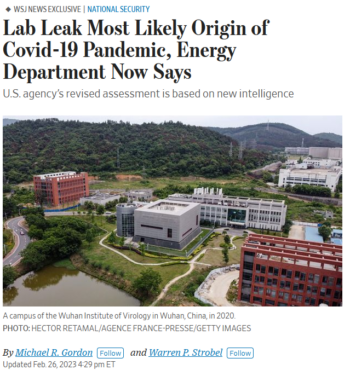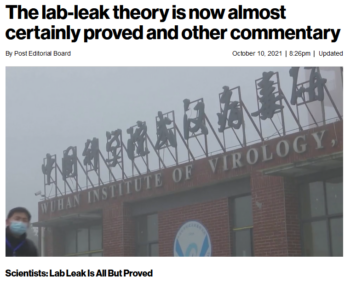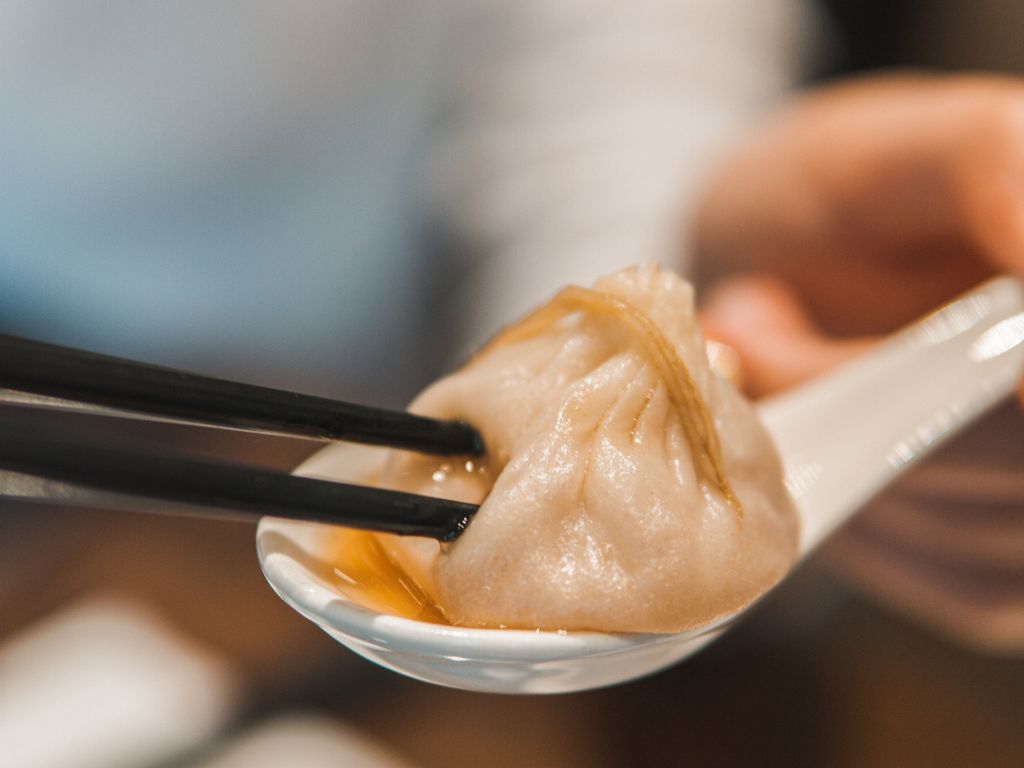
Readers should have very low confidence in the Wall Street Journal‘s assumption (2/26/23) that classified intelligence reports are helpful gauges of scientific questions.
The Wall Street Journal (2/26/23) broke the news that classified documents show the US Energy Department believes Covid emerged from a lab leak in China, which sent shockwaves through the rest of the media. Such a statement by the Energy Department “would be significant despite the fact that, as the report said, the agency made its updated judgment with ‘low confidence,’” according to the Guardian (2/26/23).
“Low confidence” is a term intelligence agencies use to signify that “information’s credibility and/or plausibility is questionable, or that the information is too fragmented or poorly corroborated to make solid analytic inferences, or that we have significant concerns or problems with the sources.”
Speaking of low confidence, Michael Gordon, one of the Journal reporters on the byline, used to write for the New York Times. There he co-authored spurious articles with the infamous Judith Miller about imaginary Iraqi weapons of mass destruction that were used to justify the US invasion of Iraq (New York Times, 9/8/02, 9/13/02; New York Review of Books, 2/26/04; Guardian, 5/27/04; FAIR.org, 3/20/13).*
Nevertheless, this one article from a sketchy reporter, relaying a single government agency’s speculations that were self-labeled as dubious, managed to reignite the lab leak controversy, with virtually every major US news outlet returning to the story.
Readers should be asking why so many in media find government talking points on a scientific question so newsworthy. There is a vast amount of scientific research that points to Covid spreading to humans from other animal hosts—“zoonotic jump” is the technical term—and pours serious cold water on the lab leak hypothesis, as well as some of the political actors who promote it.
‘Public-health groupthink’

“Officials would not disclose what the intelligence was”—but that’s good enough for the front page of the New York Times (2/26/23).
After the Journal story broke, the New York Times (2/26/23) noted that the FBI “has also concluded, with moderate confidence, that the virus first emerged accidentally from the Wuhan Institute of Virology, a Chinese lab that worked on coronaviruses.” Meanwhile, “four other intelligence agencies and the National Intelligence Council have concluded, with low confidence, that the virus most likely emerged through natural transmission.” Other outlets trumpeted the Journal’s report, giving the impression that new evidence about the pandemic’s origins had come to light (CNN, 2/27/23; NPR, 2/27/23; CBS, 2/28/23).
While this reporting indicates that there is little consensus among government agencies about the virus’ origins, those who want to believe in the lab leak myth—like Rupert Murdoch’s media empire, to which the Journal belongs—used the report as definitive proof of Chinese carelessness, or even treachery.
The Wall Street Journal editorial board (2/26/23) said the Energy Department declaration “doesn’t mean the case is definitive,” but that it adds “more evidence that the media and public-health groupthink about Covid was mistaken and destructive.” The Journal stressed that the “salient detail is that DoE’s judgment is based on ‘new’ but still secret intelligence”—which is known as the “trust us” school of journalism.
In another Journal op-ed (3/6/23), Tim Trevan, a founder of CHROME Biosafety and Biosecurity Consulting, attempted to say that money, political liberalism, careerism and social pressure clouded the scientific community’s ability to accept the lab leak hypothesis. “I am not suggesting that scientists consciously decided to thwart the truth,” he said:
You don’t have to posit conspiracy theories to explain the rush by the science establishment to exclude a lab-leak explanation to Covid. You merely have to admit that scientists are human.
Trevan offers no evidence that a lab leak caused the pandemic, to back up his insistence that scientists have been blind to the truth. He does, however, indulge in low-brow anti-Communism and orientalism, saying the “transparency” necessary for adequate laboratory safety “runs against the grain of both Communism and China’s hierarchical traditional culture.” Which is it: Is China too egalitarian in its Maoist ways, or too stuck in its backward, pre-revolutionary past?
Jonathan Turley opined at the New York Post (2/26/23) that the Journal’s scoop vindicated lab leak theorists who had been branded as racists or conspiracy nuts. Fox News (2/27/23) echoed Turley, and it gloated (2/27/23) that “reporters, pundits and media outlets” who had doubted the lab leak theory “were scolded and lampooned” as a result of the Journal report.
‘Intentionally manufactured’

You really can say anything on Fox News (2/28/23) as long as it makes the right people look bad.
Fox News host Tucker Carlson, who has promoted the racist “great replacement” myth on his show (FAIR.org, 10/20/21; NPR, 5/12/22), took the lab leak speculation and ran with it. He showcased Chinese virologist Li-Meng Yan (2/28/23), who said that “the Chinese government intentionally manufactured and released” the coronavirus behind the pandemic, while Carlson suggested “the Chinese government unleashed Covid to destroy Western economies and elevate their own position globally.”
Yan’s research, while backed by MAGA ideologist Steve Bannon (Vox, 9/18/20), has been questioned by National Geographic (9/18/20) and her own Hong Kong University (7/11/20).
Her narrative nevertheless fits into the anti-China hysteria of Fox News, and has been an important player for the right’s media war since the pandemic began. As the New York Times (11/20/20) put it:
For the diaspora, Dr. Yan and her unfounded claims provided a cudgel for those intent on bringing down China’s government. For American conservatives, they played to rising anti-Chinese sentiment and distracted from the Trump administration’s bungled handling of the outbreak.
Carlson, of course, is not bothered by the reality that the pandemic negatively impacted the Chinese economy (Wall Street Journal, 1/17/23) and led to internal political unrest (Al Jazeera, 12/22/22).

Anything you can point to is “proof” when you are not trying to examine reality but instead have a story you want to tell (New York Post, 10/10/21).
Rebroadcasting reports of official government assertions aligns nicely with the Republican agenda. The Hill (2/26/23) reported that the “lack of confidence or details on the assessment didn’t stop Republicans from claiming validation and calling for urgent action against China.” And Sen. Roger Marshall (R.–Kansas) told the Washington Post (2/28/23) that the report “gives us momentum to expose the true origins of Covid.” He added, with Michael Crichton–like flair: “I think that there’s just no way this virus could have come from nature. It’s just too perfect.”
The lab leak claim has been a major feature in Republican circles, the conservative media and anti-Beijing political tendencies for years now. The New York Post editorial board (10/10/21) claimed that the alleged lab leak, and the Chinese government’s supposed attempts to cover it up, were all but proven in the fall of 2021.
Sen. Tom Cotton (R.–Arkansas), who has insisted that China must be punished for the Covid pandemic (Fox News, 4/10/20), “said part of the widespread media dismissal of the coronavirus lab-leak theory last year stemmed from liberal networks’ financial connections to the Chinese government” (Fox News, 6/7/21).
The Journal report has raised tensions. US ambassador to China Nicholas Burns (BBC, 2/28/23) said China must “be more honest about what happened three years ago in Wuhan with the origin of the Covid-19 crisis.” It should come as no surprise that reactionary corporate shock jocks like Joe Rogan, the all-star of pandemic disinformation pundits (Washington Post, 2/2/22), are fans of the theory (Fox News, 4/12/22).
Appeals to hunches

The “zebra” in this case is the lab leak theory—rather than zoonotic transfer, which is the normal way new diseases are introduced to the human population (Des Moines Register, 2/19/23).
If the absence of anything new in the Energy Department statement didn’t seem to give reporters and editors pause, that’s because in a lot of media, the lab leak hypothesis is advanced not so much based on evidence—because as far as tracing the virus back to the lab, there is none—but on an appeal to the hunches, and prejudices, of readers.
For example, an opinion piece in the Des Moines Register (2/19/23) offered a list of events that are supposed to lead one to the idea that it could be true: The “Wuhan lab was working on bat coronaviruses, that gain-of-function work was being done there, [and] that there were concerns about the lab’s safety practices.” The Register op-ed, by former Republican congressmember and retired surgeon Dr. Greg Ganske, mused “that the pandemic started in the city where the lab is located, and that there has been no natural occurrence explanation of the virus.” The takeaway: “Which theory is most likely?”
This answer posed as a question is presented as though no one has ever considered it, yet a brief look at the scientific record confirms that the scientific community has looked into it.
First, it’s not proven that gain-of-function (GoF) research was, in fact, being conducted in subpar safety conditions at the Wuhan Institute of Virology (WIV). Basic research being conducted there has been misrepresented as deliberately trying to make viruses more dangerous to humans, along with other widespread falsehoods spread by disgraced science writer Nicholas Wade. Sen. Rand Paul accused Dr. Anthony Fauci, without evidence, of “lying” to Congress about the NIH not funding GoF research at the WIV (MintPress News, 9/29/21; Newsweek, 7/22/21).
However, even if it were proven the WIV was doing GoF research on the SARS-CoV-1-like coronaviruses known to be present there, like RaTG13 (which shares 96% genetic similarity with the genome of SARS-CoV-2, the virus that causes Covid-19), that would still not bolster the lab leak theory. For GoF experiments to create SARS-CoV-2, one would need to start with a virus with at least 99% genetic similarity, and there is no evidence the Wuhan lab had anything like this (Health Feedback, 3/19/21; Cell, 9/16/21).
Cutting through the noise

NPR (2/28/23) asked the right question.
One mainstream media report in the aftermath of the Journal “exclusive” cut through the noise, noting that while US government agencies bicker about which low-confidence report is correct, the scientific community is not particularly divided. “Virologists who study pandemic origins are much less divided than the US intelligence community,” NPR (2/28/23) reported, adding that “they say there is ‘very convincing’ data and ‘overwhelming evidence’ pointing to an animal origin.”
The Energy Department disclosure comes one year after two peer-reviewed studies concluded that wildlife susceptible to SARS-CoV-2 present at the Huanan Seafood Market in Wuhan was the most likely origin of the pandemic (Science, 7/26/22, 7/26/22), and that there were likely two, not one, animal spillovers at the market, since a preponderance of the earliest known Covid-19 cases have a direct or indirect link there, instead of to the WIV, which is nearly 10 miles away.
In the earliest days of the pandemic, two distinct genetic variants of SARS-CoV-2 (known as lineages A and B) were circulating in Wuhan’s population. If the pandemic truly originated at the WIV, as many lab origin proponents suspect, one would have to posit convoluted scenarios, like one person from the WIV being infected with lineage B and immediately going to Huanan Market, not infecting anyone on the way; and another person at WIV being independently infected with lineage A, also immediately going to the market a week later. Both hypothetical spreaders would each have to leave no trace at the lab or any other location in Wuhan, to explain why the preponderance of the earliest known Covid-19 cases are clustered near the market instead of near the WIV.
This is why scientists like Angela Rasmussen and Michael Worobey (Globe and Mail, 7/28/22), for example, have concluded that “the evidence base for the origin of SARS-CoV-2 is more robust and conclusive than nearly any other emergent virus in the past century.” They noted that “we have access to the home locations of the earliest known 174 COVID-19 cases in the world.” The authors noted that scientists have “never had a spatial record like this, of the ignition of any other pandemic, in human history”:
Using the data available and the scientific method in which we have been trained, we have shown that the likelihood of SARS-CoV-2 originating anywhere other than the Huanan market is vanishingly slim.
The “much simpler explanation” of SARS-CoV-2 being introduced to the human population by “two separate zoonotic transmission events at the market,” the authors conclude, is much more likely in comparison.
Evidence of animal origins

Scientists offering new evidence about the origin of Covid-19 was a much less compelling story than spies offering new speculation (Atlantic, 3/16/23).
More recent evidence from scientists researching previously unavailable genetic material collected by Chinese investigators from swabs at the Huanan Seafood Wholesale Market in January 2020—shortly after Chinese authorities shut that market down on suspicions it was linked to the virus’s outbreak—definitively shows that multiple animal species known to be susceptible to SARS-CoV-2 (most notably raccoon dogs) were present at the market, since animal DNA there was found to be commingled with SARS-CoV-2 (Atlantic, 3/16/23; Zenodo, 3/20/23). This corroborates photographic and business records of illegal live animal sales being conducted there right before the pandemic’s outbreak, despite the Chinese government’s lies and stonewalling regarding the wildlife trade (Nature, 6/7/21; Science, 8/18/22).
While these findings aren’t smoking-gun evidence of an animal origin, because the data doesn’t distinguish whether the virus collected in the wildlife stall there was brought there by wildlife or by already-infected humans, they are still significant. The area in the market where most of the SARS-CoV-2 positive samples clustered was also where most of the samples containing wild animal DNA were found, whereas human genetic material was most abundant in other parts of the market (indicating the pandemic likely spread from animals to humans, rather than the other way around). This is entirely consistent with a market origin, and exactly what one would expect to find if the Huanan Market was indeed the origin of the pandemic (Nature, 3/21/23; Science, 3/21/23).
But despite the positive evidence in favor of a zoonotic origin, in comparison to no evidence whatsoever for a lab origin, the Journal ran with the Energy Department statement as though it were a scientific revelation, and the rest of the media went along for the ride. It’s easy to chalk that up as mere journalistic laziness, but one has to wonder if there is something more sinister afoot, given US corporate media’s enthusiastic participation in the US governments’ propaganda campaign to pump up China as an adversary (FAIR.org, 3/16/23).
In a media environment raising tensions over a Chinese balloon (FAIR.org, 2/10/23), and an Air Force memo about possible war with China (CounterPunch, 2/7/23), along with the Biden administration’s decision to send up to 200 more troops to Taiwan (Wall Street Journal, 2/23/23), reports on a government disclosure about a potential lab leak with no real new information create more friction between the two military giants, and bring us no closer to understanding the pandemic’s origins or how to prepare for the next viral catastrophe.
* To be fair, the other co-author, Warren Strobel, was one of the very few in corporate media to report skeptically on WMD claims, along with his partner at Knight Ridder, Jerry Landay (Extra!, 3–4/06). In recent years, however, Strobel has produced far more credulous work, including a piece whitewashing the torture record of CIA director Gina Haspel (Wall Street Journal, 5/25/19; see FAIR.org, 6/6/19).
The post Media’s Lab Leak Theorists See Spies, Not Scientists, as Arbiters of Science appeared first on FAIR.






![afcl3.jpg Stand-up comedian Bill Burr [right] joked in 2018 that calling U.S. Navy catapult officers [left] on aircraft carriers heroes is a bit of a stretch, given that they often are doing nothing more than “warrior one” yoga poses. Credit: Associated Press [right]; AFP](https://www.rfa.org/english/news/afcl/china-usa-comedians-06022023170220.html/afcl3.jpg/@@images/30ed2b35-64e0-405f-b790-5803540fb737.jpeg)














 Sending US troops to Taiwan is "on the table," says Chairman of the House Committee on Foreign Affairs of the US Michael McCaul
Sending US troops to Taiwan is "on the table," says Chairman of the House Committee on Foreign Affairs of the US Michael McCaul 

 (@AZgeopolitics)
(@AZgeopolitics) 










